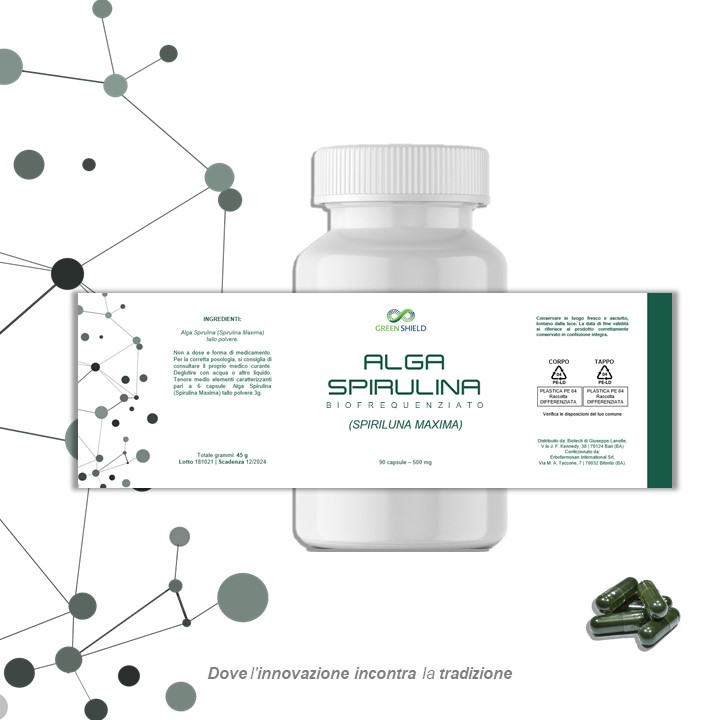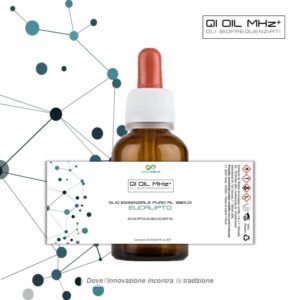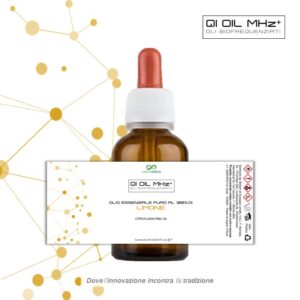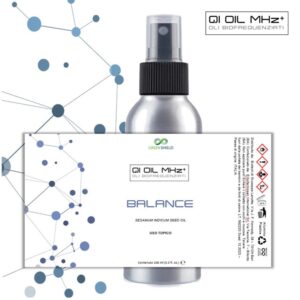SPIRULINA ALGAE (SPIRILUNA MAXIMA)
Benefits and properties of Spirulina.
The benefits and properties of Spirulina are many, the studies demonstrating its effects are many and all agree that: Spirulina improves the quality of life:
Promotes neuroprotective and anti-aging effects.
It has rejuvenating properties, containing many antioxidants (zinc, vitamin D…) which protect against free radicals that are enemies of the skin. It contains large quantities of beta-carotene, a precursor of vitamin A, an essential component for healthy skin. Its action against skin dryness is scientifically recognized. Spirulina’s composition gives more luster to the skin and hair. A diet rich in fruit and vegetables, including Spirulina, reduces the aging of the central nervous system.
Helps you lose weight.
A diet rich in fruit, vegetables, and Spirulina helps you maintain your figure and reach your ideal weight without too many sacrifices. It is not a drug, does not act as a suppressor of biochemical receptors, and does not contain any chemicals that ‘trick’ the body. Spirulina is a natural ‘compressed’ food and, if taken one hour before meals, it lowers the sense of hunger, as it contains 70% protein which promotes the transmission of the satiety signal to the brain.
Reduces the level of cholesterol and premenstrual syndrome (PMS)
Spirulina, taken daily, helps lower blood levels of LDL and VLDL thanks to its richness in Omega-6. These essential fatty acids help dissolve cholesterol deposits in the arteries that cause heart attacks and strokes. In addition, the vitamin PP content in Spirulina helps to lower LDL and increase HDL, or ‘good’ cholesterol.
Highly antioxidant.
Spirulina contains well over ten times more beta-carotenoids than any other vegetable. This lowers the risk of cancer, as shown by numerous scientific studies over the last few decades that have outlined guidelines for reducing the risk of all types of cancer. In addition, Phycocyanin, contained in high levels in Spirulina, is a powerful protein that promotes the self-destruction of cancer cells.
It has detoxifying properties and is ideal for programmed fasting programs.
Numerous studies have shown that spirulina can have beneficial effects on heavy metal detoxification and can therefore be introduced into dietary plans based on programmed fasting.
The energy source for bodybuilders and athletes
Spirulina is concentrated energy. Its contributions in iron, vitamin B12, and beta-carotene are therefore of great interest to the sport, particularly in terms of oxygenation of the muscles. The purification activity induced by Spirulina enables rapid and efficient removal of pollutants and lactic acid.
Spirulina contains as much as 65% highly digestible protein. Low in fat, it thus enables an increase in energy and faster physical recovery after training or competition.
Protein is essential for proper endurance training but also for regenerating body tissue. Spirulina is therefore beneficial for athletes and bodybuilders, who need an extra supply of concentrated nutrients.
Supports the health of pregnant women and children.
By the nutritional characteristics mentioned above and its high calcium, iron, magnesium, and phosphorus content, spirulina as a ‘superfood’ is ideal for pregnant women and children.
Strengthens the immune system.
Spirulina can effectively stimulate the immune system due to its richness in antioxidants (beta-carotene and vitamin E) and carbohydrates. It helps combat oxidative stress, which is largely responsible for autoimmune diseases, degenerative diseases, and allergies. Recent studies have shown that Spirulina not only has positive effects on the immune system but also stimulates the body’s ability to generate new cells in the blood. Published studies have shown that Spirulina accelerates the production not only of antibodies and cytokines but also of T-cells, macrophages, B-cells, and Natural Killer cells.
Fights fatigue
Spirulina helps combat fatigue by producing excitement thanks to its high content of polysaccharides, B vitamins, and essential fatty acids. It also helps increase energy levels by acting on healthy gut bacteria due to its prebiotic effect, which stimulates the production of vitamin B6, known to help release energy.Questo rende la spirulina adatta a combattere la perdita di energia e la rende un piccolo integratore alimentare.
It is used against malnutrition
Spirulina has the great capacity to greatly improve the nutritional status of children living in developing countries where, according to the WHO, malnutrition is the main factor in 40% of the 11 million child deaths under five years of age and has disastrous consequences on children’s health such as reduced immunity and developmental delay. Spirulina’s remarkable effects in combating malnutrition have already been observed with doses of 1 to 3 grams per day for 4 to 6 weeks.
Corrects the functioning of the liver
Spirulina strongly assists the liver, a key organ in our digestion, to stay healthy by producing bile juice, synthesizing amino acids, various enzymes, and coenzymes. Many Japanese clinical reports have noted that Spirulina has preventive and corrective power for fatty liver and hepato-cirrhosis based on positive results from experiments carried out by having patients with liver disorders take Spirulina. They recorded positive effects after only one month’s intake and restoration of normal liver function after three months. Spirulina thus complements the work of other liver-supporting foods such as apricots, soy sprouts, cucumbers, green vegetables, lemons, raw goat’s milk, papaya, healthy animal liver, and more.
SPIRULINA ALGAE (SPIRILUNA MAXIMA)
COMPOSITION:
Spirulina algae (Spirulina Maxima) thallus powder.
RECOMMENDATIONS FOR USE:
Not to dose and form of medication. For the correct dosage, consult your doctor. Swallow with water or other liquid. The average content of active ingredients per 6 capsules: Spirulina algae (Spirulina Maxima) thallus powder 3g.
90 Capsules – 500mg.
PUBLICATIONS:
- Dr Jean-Louis Vidalo Spiruline, l’algue bleue de santé et de prévention, , ed.Dauphin, 2008
- Shklar G, Schwartz J. Tumor necrosis factor in experimental cancer regression with alpha-tocopherol, beta-carotene, canthaxanthin, and algae extract. Eur J Cancer Clin Oncol, 1988 May
- Mathew B, Sankaranarayanan R, Evaluation of chemoprevention of oral cancer with Spirulina fusiformis. Nutr Cancer 1995 ;24(2):197-202.
- Sankaranarayanan R, Mathew B, Chemoprevention of oral leukoplakia with vitamin A and beta carotene: an assessment. Oral Oncol 1997 Jul;33(4):231-6.
- Mishima T, Murata J, Inhibition of tumor invasion and metastasis by calcium spirulina (Ca-SP), a novel sulfated polysaccharide derived from a blue-green alga, Spirulina platensis. Clin Exp Metastasis 1998 Aug;16(6):541-50
- Parikh P, Mani U, Iyer U. Role of Spirulina in the Control of Glycemia and Lipidemia in Type 2 Diabetes Mellitus. J Med Food. 2001 Winter;4(4):193-199.
- Becker EW, Jakober B, Clinical and biochemical evaluations of the alga Spirulina about its application in the treatment of obesity. A double-blind cross-over study. Nutr Rep Int. 1986 ;33:565-57.
- Torres-Duran PV, Juarez-Oropeza MA, Antihyperlipemic and antihypertensive effects of Spirulina maxima in an open sample of Mexican population: a preliminary report / Lipids Health Dis, 2007 Nov 26
- Pascaud, M. “The essential polyunsaturated fatty acids of Spirulina and our immune response”. In : Doumengue, F., Durand-Chastel, H., Toulemont, A., Eds. Spiruline algue de vie, 1993-
- Al-Batshan, H.A., Al-Myfarrej, S.I., Al-Homaidan, A.A., and Qureshi, M.A. Enhancement of chicken macrophage phagocytic function and nitrite production by dietary Spirulina platensis. Immunopharmacol Immunotoxicol 23:281-289.
- Borchers AT, Belay A, Keen CL, Gershwin ME (2007) Spirulina and Immunity in In Gershwin & Belay (ed.) Spirulina in Human Nutrition and Health: 177-193, 2007





Reviews
There are no reviews yet.